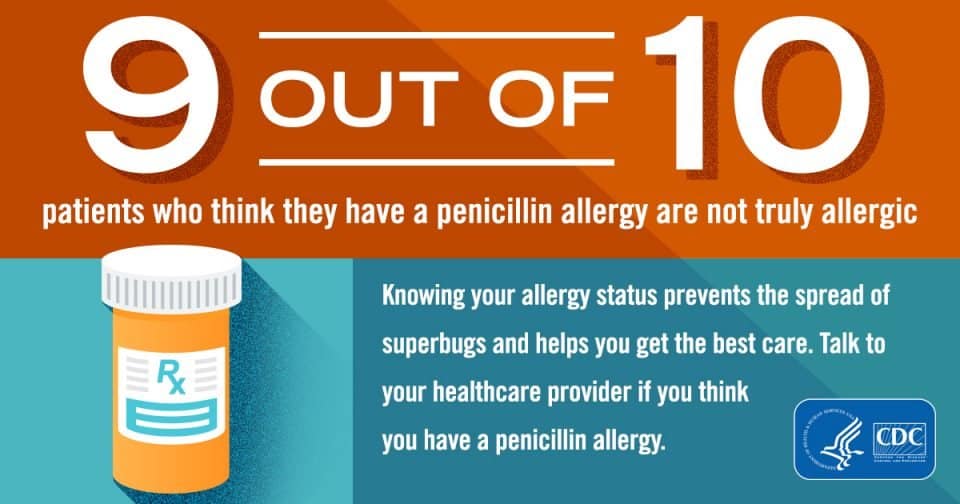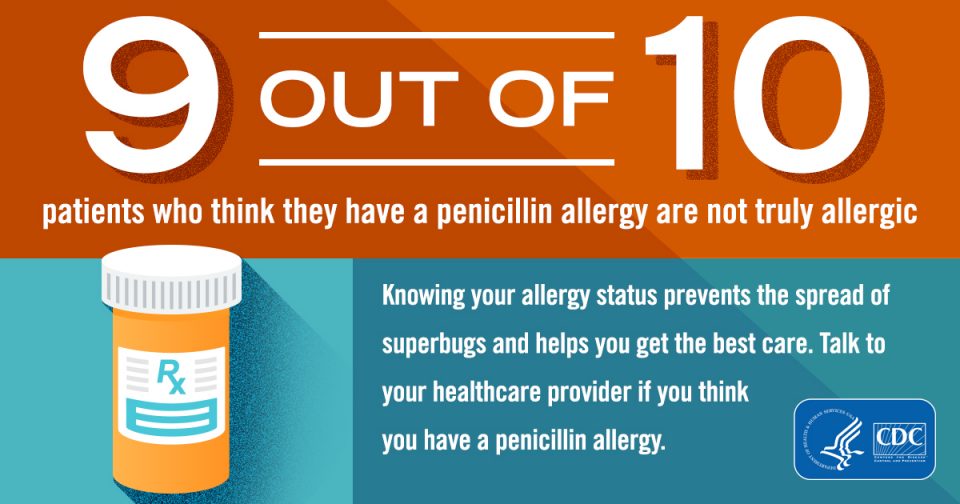Do you think you have a penicillin allergy? Did your mom or dad tell you that you have an allergy to penicillin, but you don’t really know?
The penicillin group of antibiotics works really well for dental implant and bone grafting procedures. In fact, patients who are not treated with the penicillin type of antibiotics, such as amoxicillin or Augmentin, have a higher rate of implant and bone graft complications/failures!
The video below is from a well-respected allergy physician. I have found that most of my patients are not allergic to penicillin even though they say they are. If you were to have a reaction, it is typically pretty mild and not anaphylactic shock.
The other issue with dental implants/bone grafting surgery on a penicillin-allergic patient is, oftentimes, the go-to antibiotic is clindamycin. The jury is out on whether or not it really is helpful or harmful from a dental implant bone graft perspective, but the reality is it also has a higher chance of stomach-related problems (the worst being C. difficile, which can hospitalize you).
I always have a very extensive discussion with my patients who are penicillin allergic. If you have had hives or welts, that’s a real allergy versus stomach upset.
Also, just because a close relative has an allergy to penicillin this does not mean that you will as well.
The vast majority of patients that I’ve had complications with were allergic to penicillin (or said they were) and were unwilling to take a different antibiotic…this is my own 20-year perspective doing dental surgery.
Antibiotics should always be used judiciously as some dental implant procedures require antibiotics. Sometimes the risks outweigh the benefits while other times the benefits outweigh the risks. The clinical judgment and expertise of your implant dentist should help guide you on doing the right thing.
Ramsey A. Amin, D.D.S.
Diplomate of the American Board of Oral Implantology /Implant Dentistry
Fellow-American Academy of Implant Dentistry



My doctor prescribed Amoxicillin before the tooth extraction and bone graft surgery. During the second week, I noticed some face swelling but went away in two days. The next day my tongue began to swell for a day and night accompanied by pain when trying to swallow. My mouth has been having a weird taste and smell. Is this a sign of allergic reaction to amoxicillin?
The part you said about tongue, swelling and difficulty swallowing, can be an ominous sign of a very bad allergy. I would discontinue if I were you, but speak to your dentist ASAP.
I did a bone augmentation procedure for the central front tooth (taking part of the chin), and the surgeon added membrane and bone powder over the upper bones ( he thought the bone was weak and powder would make it more robust). After two months, an infection happened, and the doctor had to open the gum again and clean all the infected bones ( he did a deep cleaning and took a lot of bones).
He said I am allergic to bone powder and avoid it in future procedures.
My question is, Is this true I am allergic to bone powder? Can I do any tests that can confirm that?
I can share with you the pictures of the procedure and infection.
You are not allergic to any of the bone products. The graft just did not work. This is called a block graft. I do many of these. The technique and experience of the dentist is really critical to this working. I hope you don’t smoke 🚭 which is a huge risk.
I was given 4 clindomyacin capsules immediately before implant surgery and continued to take for a day after. The cramps and constipation, especially the cramps in abdomen were so bad, I was doubled over for days. Implant surgeon told me to stop antibiotics. Going back tomorrow, a week later for check in. Did they give me too many pills right before surgery?
Stopping the antibiotic is the best thing you can do. I would take a probiotic as well and eats some yogurt with active cultures on a daily basis for a while.
The answer to your question is no. 4 tablets of clindamycin right before the surgery is not too much at all and is considered actually a standard dose. Unfortunately some people are sensitive to antibiotics. Clindamycin can be a bit rough. If you are having continued abdominal pain you need to see a doctor right away for the very low chance that you have something called Clostridium difficile also known as C. diff.
Thanks for your comment. Exactly what i have done.
Get well 😊
I had # 27 & #29 extracted with bone grafts. 27 to 32 are all missing. Being allergic to penicillin I was given Zpak which I had taken before without and complications. MybTMJ hurt so much then I had pLe stools, no gallbladder, then cramps diarrhea and lost 12 pounds. I had C-Diff in 2007 so used probiotics, yogurt.. After 8 weeks I am beginning to eat but after this experience being 83 years of age I don’t believe bone graft will be successful because of poor nutrition. I was hoping to at least have implant for # 27 but not worth this much agony. Antibiotics can have very bad side effects.
Wow… That that soft story right the. If you had C. difficile in the past you are more likely to get it from any antibiotic in the future. I prescribe probiotics to all of my patients who receive antibiotics. We use a yeast-based probiotics so that it is not killed by the antibiotic in the process.
Alternative in your case would be to use your own bone rather than any sort of tissue donor or cow bone along with L PRF. It is less likely to become infected and reduces the need for antibiotics during bone grafting.
I’ve had a dental implant last Spring & was prescribed Clindamycin, due to a Penicillin allergy. I developed C-diff. from the antibiotic & am still struggling w/stomach issues. Since then I was finally going to get a crown on the implant only to have been told by my dentist that the implant looks like it’s failing. A sore has developed alongside the gum of the implant. I will be going to the Oral surgeon this next week & am worried about being put on another antibiotic, as I’m fairly certain the implant will be removed. Are there antibiotic injections that would be much safer than an oral antibiotic, so as to prevent a C-diff. reoccurrence????
yikes… Typically you can be treated with vancomycin and/or metronidazole to treat the C. difficile. Depending on the level of difficulty of the procedure you may or may not need to go onto an antibiotic. Consider an alternative such as a newer generation cephalosporin but those are discussions to have with your doctor who may or may not be fully informed about clindamycin and its problems. I hope you get better!
How interesting, i have often wondered if i am allergic as i never was and i only got a slight itch years ago and was told not to have it anymore as the next time i might get a worse reaction, i thought what ? so since then i am down as allergic but have always thought i do not really believe it and was very disappointed to think i could not use it as it is a wonderful anti biotic ? over time and even recently i have thought i really do not think i am allergic / and in 2012 i was put on cylindamycin 9× day i even questioned that as i had never been on that such a high dose of anything i got a bad reaction to that but the dosage was so high and that may have been the real cause i was only on that for 3x days and i got the dr to stop it.So i find your blog on this most interesting.
Regards Julie